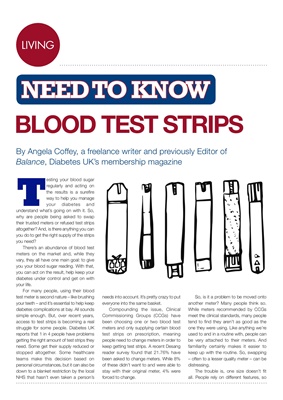
LIVINGLIVING
By Angela Coffey, a freelance writer and previously Editor of
Balance, Diabetes UK's membership magazine
T
esting your blood sugar
regularly and acting on
the results is a surefire
way to help you manage
your diabetes and
understand what's going on with it. So,
why are people being asked to swap
their trusted meters or refused test strips
altogether? And, is there anything you can
you do to get the right supply of the strips
you need?
There's an abundance of blood test
meters on the market and, while they
vary, they all have one main goal: to give
you your blood sugar reading. With that,
you can act on the result, help keep your
diabetes under control and get on with
your life.
For many people, using their blood
test meter is second nature - like brushing
your teeth - and it's essential to help keep
diabetes complications at bay. All sounds
simple enough. But, over recent years,
access to test strips is becoming a real
struggle for some people. Diabetes UK
reports that 1 in 4 people have problems
getting the right amount of test strips they
need. Some get their supply reduced or
stopped altogether. Some healthcare
teams make this decision based on
personal circumstances, but it can also be
down to a blanket restriction by the local
NHS that hasn't even taken a person's
needs into account. It's pretty crazy to put
everyone into the same basket.
Compounding the issue, Clinical
Commissioning Groups (CCGs) have
been choosing one or two blood test
meters and only supplying certain blood
test strips on prescription, meaning
people need to change meters in order to
keep getting test strips. A recent Desang
reader survey found that 21.76% have
been asked to change meters. While 8%
of these didn't want to and were able to
stay with their original meter, 4% were
forced to change.
So, is it a problem to be moved onto
another meter? Many people think so.
While meters recommended by CCGs
meet the clinical standards, many people
tend to find they aren't as good as the
one they were using. Like anything we're
used to and in a routine with, people can
be very attached to their meters. And
familiarity certainly makes it easier to
keep up with the routine. So, swapping
- often to a lesser quality meter - can be
distressing.
The trouble is, one size doesn't fit
all. People rely on different features, so
NEED TO KNOW
BLOOD TEST STRIPS